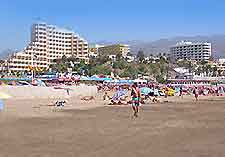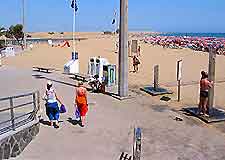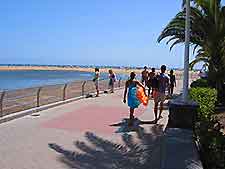Gran Canaria Life and Visitor Travel Tips
(Gran Canaria, Canary Islands, Spain)

Gran Canaria is often referred to as a 'Small Continent', due to its diverse landscape and micro-climates around the island, with mountains, canyons, desert areas, lush tropical forests and spectacular sandy beaches, all within easy reach of each other.
Much of life on Gran Canaria is centred around the tourism trade, particularly on the south side of Gran Canaria, where visitors are always welcomed and sandy beaches are plentiful. Las Palmas de Gran Canaria, the island's capital city, is also the joint capital of the Canary Islands (together with Santa Cruz de Tenerife) and has a real big-city feel.
The third-biggest island in the group of Canary Islands, Gran Canaria is surrounded by the Atlantic Ocean and is close to both Tenerife, which stands to the southeast of Gran Canaria, and Fuerteventura, which is located to the west. Travel tips and advice are available around the island, with tourist information centres and kiosks in plentiful supply. The Internet is also a useful source for the latest information about Gran Canaria, particularly when checking hotel availability.
Tourism and Tourist Information (Oficinas de Turismo)
The tourist information service on the Gran Canaria has a number of outlets, where you will find useful tourism information including travel guides and maps, attractions leaflets and brochures, and hotel booking services. Las Palmas, the capital of Gran Canaria, offers the highest concentration of tourist centres and kiosks, with the main office being located along the Calle León y Castillo, and a further bureau situated at the bus station, which is open seven days a week.
Las Palmas Tourist Office
Address: Calle León y Castillo, Las Palmas, Gran Canaria, Canary Islands, Spain
Tel: +34 928 219 600
Open hours: Monday to Friday - 08:00 to 14:00
Telde Tourist Office
Address: Plaza de San Juan, Telde, Gran Canaria, Canary Islands, Spain
Tel: +34 928 139 055
Open hours: Monday to Friday - 08:00 to 15:00

Language
Spanish is the third most widely spoken language in the world, after Chinese and English. Although Spanish is the main language in Gran Canaria, English, French and German are often understood at most tourist attractions and other venues that cater for visitors. In smaller towns and villages on the island, it is often useful to bring a phrase book.
Tipping
Tipping is quite discretionary in Gran Canaria, with most taxi drivers being happy with a little rounding up, although this is by no means essential. Restaurants always include service charges by law and these should be clearly stated on the menus, although a basic tip will still be expected and very much appreciated. Hotel staff, such as luggage handlers, happily accept a small tip, which can be just one Euro or more. Generally, no other public service workers on the island of Gran Canaria expect tips. You should always pay tips in cash, as this way you can be sure that the person it is intended for receives it fully.

Sunburn and Sunbathing
Located close to the Sahara, the Canary Islands are known for their clear skies and fine, sunny weather, and Gran Canaria is no exception. Even on cloudy and breezy days, sunburn can be likely, so always take the necessary precautions, using high-factor sun lotions regularly throughout the day, particularly when sunbathing on one of Gran Canaria's many beaches.
Places of Worship
The national religion of Gran Canaria and throughout Spain is Roman Catholic, although many additional faiths and religions are well-represented in Gran Canaria, such as Protestants and Muslims. There are a huge number of churches that welcome visitors, although these generally operate a fairly formal dress code.
Smoking
In many buildings and on all methods of Gran Canaria's public transport, rules now restrict smoking, with clear no-smoking signs in prominent places and harsh penalties. As from 2006, all offices, restaurants, and children's venues must be smoke-free or have designated smoking rooms and separate smoking areas. Both locals and visitors in Gran Canaria often choose to only smoke outside, with many restaurants offering al fresco dining and patio areas where you can smoke if required.
Tips for Using the Euro
The Euro is made up of eight coins and seven paper notes and was introduced on January 1, 2002. The 12 original members of the European Union - Austria, Belgium, Finland, France, Germany, Greece, Ireland, Italy, Luxembourg, Netherlands,
Portugal, and Spain - planned the event for many years in advance, deciding upon a specific conversion rate for each country's national currency. The colourful Euro bills, which include holograms and shades of green, yellow, blue, mauve, and orange, are identical throughout Europe. Coins have one common and one national side, but they can be used in any of the member countries, regardless of the country of issue. Old currencies are no longer accepted as legal tender, although major banks will happily convert them into Euros.
Telephones and Emergency Numbers
- Emergencies in Gran Canaria - for police dial 091 (national) or 092 (local)
- For fire emergencies in Gran Canaria - dial 080 or 085 and for an ambulance dial 409 5530
- To call from one city code to another in Gran Canaria- first dial '0' followed by the Spanish city code and the main telephone number
Safety
On the whole, Gran Canaria is a safe and friendly place, although pickpockets and bag snatchers do have a presence, so always be conscious of your belongings, and in particular, hand baggage and money. Wear cameras and bags across your body and consider using a safe and discreet money belt. Also, when in Gran Canaria, always avoid leaving valuables in your car and hotel room, and be sure to park your car in a hotel car park or well-lit area.
Taxes
VAT (IVA) is always included in the price and refunds are not usual in both Gran Canaria and throughout Spain. Tourists visiting Gran Canaria from countries outside of the EU may be able to claim a refund on tax if the item was purchased for personal use only and cost more than a specified amount. The shopkeeper can provide further details if required.
 Gran Canaria is often referred to as a 'Small Continent', due to its diverse landscape and micro-climates around the island, with mountains, canyons, desert areas, lush tropical forests and spectacular sandy beaches, all within easy reach of each other.
Gran Canaria is often referred to as a 'Small Continent', due to its diverse landscape and micro-climates around the island, with mountains, canyons, desert areas, lush tropical forests and spectacular sandy beaches, all within easy reach of each other.
